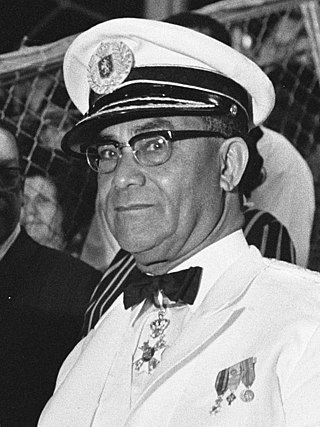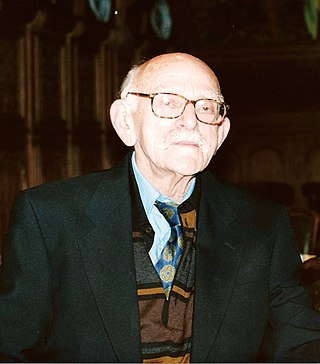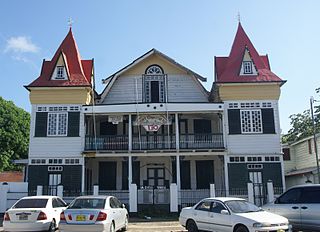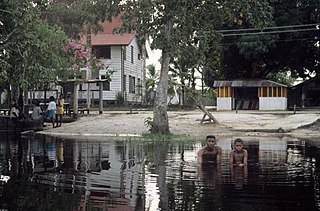
Cornelis Gerhard Anton de Kom was a Surinamese resistance fighter and anti-colonialist author. He was arrested in Surinam and the protest against his arrest resulted in two deaths. De Kom was subsequently exiled to the Netherlands where he wrote Wij slaven van Suriname, an anti-colonial book. During World War II, he joined the resistance, was arrested, and sent to concentration camps where he died. In 2020, de Kom was added as a subject on the Canon of the Netherlands, a chronological list of fifty key events and people in Dutch history to be taught in schools.

Johan Henri Eliza Ferrier was a Surinamese politician who served as the 1st president of Suriname from 1975 to 1980. He was also the country's last governor-general before independence, serving from 1968 to 1975, before becoming the first president upon independence from the Kingdom of the Netherlands in 1975.

Cynthia Henri McLeod is a Surinamese novelist known for her historic novels and whose debut novel instantly made her one of the most prominent authors of Suriname.

Michaël Henricus Gertrudis (Michiel) van Kempen is a Dutch writer, art historian and literary critic. He has written novels, short stories, essays, travel literature and scenarios. He was the compiler of a huge range of anthologies of Dutch-Caribbean literature and wrote an extensive history of the literature of Suriname, in two volumes.

Julius Caesar de Miranda was a Surinamese jurist and politician. De Miranda was the first prime minister of Suriname.

George Dewendrepersad Hindori was a Surinamese politician.

Surendre Sradhanand "Soerinder" Rambocus was a Surinamese serviceman. For a short period, he was the highest-ranking officer of the Suriname National Army. He was involved in the unsuccessful coup d'état of March 1982 against the then dictator of Suriname, Dési Bouterse, and was executed on 8 December 1982 as one of the December murders.

Hugo Pos was a Surinamese judge, writer, and poet.

Julius Gustaaf Arnout Koenders was a Surinamese teacher and fervent activist for Sranan Tongo. As a teacher, he was forced to use the Dutch language thus denying the children their own language. He was an early advocate of Sranan and Creole culture.

Shrinivási was a Surinamese poet. Martinus Haridat Lutchman was born in Kwatta, Suriname and a teacher by profession. In 1949 he moved to Curaçao where his earliest poetry was published as Fernando in the magazine Caraïbisch Venster. Lutchman decided to change his pseudonym to Shrinivási which means noble resident of Suriname, and published in Tongoni (1958-1959), Soela (1962-1964) en Moetete (1968). His first publication of a collection of poetry was Anjali in 1963. His best known collections are Pratikshā (1968), Om de zon (1972), and Sangam (1992).

Harry Sharuh Radhakishun was a Surinamese businessman and politician. He served as Deputy Prime Minister of Suriname and Minister of Finance from 1969 to 1973, and as Minister of Agriculture, Livestock and Fisheries from 1963 to 1967.
Maria Johanna Francisca Renée "Noni" Lichtveld was a Dutch-Surinamese author, illustrator and scenic designer.

Court Charity is a friendly society of the Foresters Friendly Society. It is located on Burenstraat in the centre of Paramaribo, Suriname. The building is a monument.

David George Findlay was a Surinamese politician, editor, and writer. He was the owner and chief editor of the newspaper De West.

Abraham Arnold Lodewijk "Bram" Rutgers was a Dutch botanist and politician who served as Governor-General of Suriname from 1928 until 1933, the Council of State from 1936 until 1959, and served as its Vice-President from 1956 onwards. He was a member of the Anti-Revolutionary Party (ARP).

Christiaan Hendrik "Hein" Eersel was a Surinamese linguist and cultural researcher.

Coropina Creek is a blackwater river in the Para district of Suriname. The river originates in swamp forests in southern Para, meanders through the district, and eventually merges with the Para River.
Willy Alberga is a Surinamese journalist and writer. She is known as the longtime host of the Radio Apintie program "Niet zomaar een gesprek."
Henna Goudzand Nahar is a Surinamese fiction writer and journalist. She has written under the pen names Amber and Amber Nahar.

















